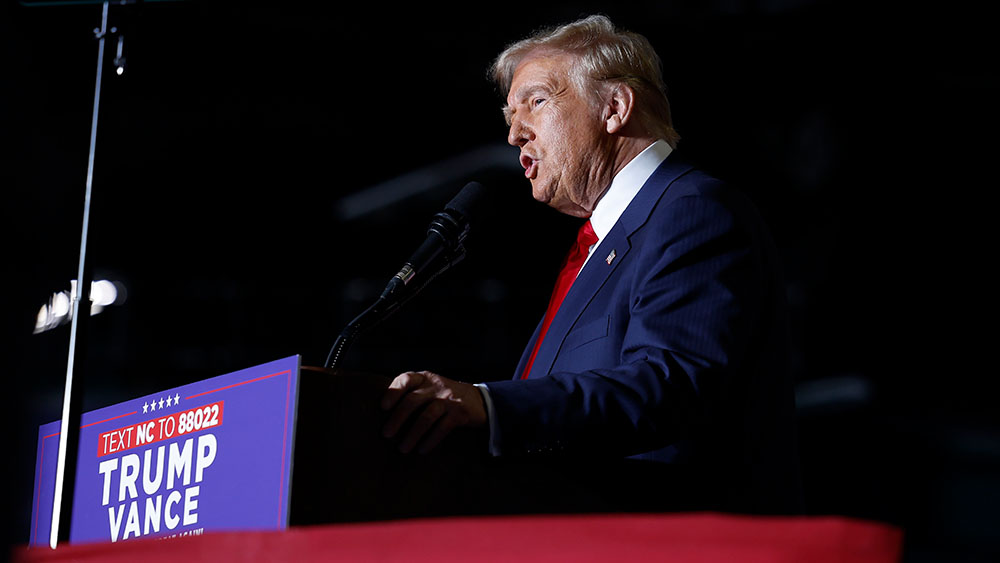 Parler
Parler Gab
Gab
- Senator Susan Collins (R-ME) announced her support for Robert F. Kennedy Jr.'s nomination as secretary of the Department of Health and Human Services, a pivotal boost for his confirmation.
- Kennedy's assurance to "re-examine" the White House's proposed NIH funding cuts swayed Collins, addressing her concerns about biomedical research.
- Collins' endorsement, despite Kennedy's controversial stance on vaccines and lack of medical background, highlights the growing influence of natural health advocates within the Republican Party.
- The nomination has drawn fierce opposition from mainstream medical professionals, citing Kennedy's lack of formal medical training and past claims about vaccine safety.
- Kennedy's confirmation, if successful, would mark a significant departure from traditional health policy leadership and likely face intense scrutiny from supporters and critics alike.
A polarizing figure with a passionate base
Robert F. Kennedy Jr., an environmental attorney and scion of the Kennedy political dynasty, has long been a polarizing figure. While he has no formal medical training, his advocacy for vaccine safety and skepticism of pharmaceutical industry practices has earned him a devoted following among conservatives and natural health proponents. Kennedy’s nomination has drawn fierce opposition from mainstream medical professionals. Over 15,000 physicians, including 150 from Maine, signed a letter urging the Senate to reject his nomination. Dr. Jay Maliboff, a retired OBGYN, criticized Kennedy’s claims, stating, “RFK Jr. has claimed with zero evidence that vaccines are tied to autism, despite evidence conveyed through studies over decades that have disproven such a claim.” Despite these concerns, Kennedy has maintained that he is not “anti-vaccine or anti-industry,” but rather “pro-safety.” His supporters argue that his willingness to challenge conventional wisdom and prioritize transparency in health policy makes him an ideal candidate to lead HHS.The NIH funding debate: A turning point
One of the key issues that swayed Collins was Kennedy’s commitment to re-examining the White House’s proposed NIH funding cuts. The NIH, a cornerstone of biomedical research in the United States, has faced significant budget constraints in recent years. Collins, a longtime advocate for medical research, expressed concern that further cuts would jeopardize critical studies and clinical trials. “The NIH funding cap would be devastating, stopping vital biomedical research and leading to the loss of jobs,” Collins said earlier this year. Her conversation with Kennedy appears to have alleviated some of these concerns, as he pledged to revisit the issue upon confirmation. The debate over NIH funding is emblematic of a broader tension within the Republican Party. While fiscal conservatives advocate for reduced government spending, others, like Collins, emphasize the importance of investing in scientific research to maintain America’s global leadership in medicine and innovation.A new chapter for health policy?
Kennedy’s confirmation would mark a dramatic departure from traditional health policy leadership. His emphasis on vaccine safety, skepticism of pharmaceutical companies and advocacy for natural health solutions align with the priorities of many conservative voters who feel disillusioned with the medical establishment. However, his nomination has also exposed deep divisions within the GOP. Senator Bill Cassidy (R-LA), a physician and chair of the Senate Health Committee, initially expressed skepticism about Kennedy’s views on vaccines but ultimately voted to advance his nomination. Cassidy emphasized that Kennedy “has been insistent that he just wants good science and to ensure safety,” adding that he would not allow HHS to withdraw access to vaccinations without “ironclad, causational scientific evidence.” President Trump, who has long championed Kennedy’s nomination, took to Truth Social to express his support. “20 years ago, Autism in children was 1 in 10,000,” Trump posted. “NOW IT’S 1 in 34. WOW! Something’s really wrong. We need BOBBY!!!” While Trump’s post did not explicitly link autism to vaccines, it echoed Kennedy’s longstanding concerns about the rise in autism diagnoses.What’s next for RFK Jr. and HHS?
With Collins’ support, Kennedy’s confirmation appears all but assured. The Senate is expected to vote on his nomination this week, and betting platforms like Kalshi and Polymarket place his odds of confirmation at 96% and 97%, respectively. If confirmed, Kennedy will face the daunting task of leading an agency responsible for overseeing drug and vaccine safety, Medicare and Medicaid, and public health initiatives. His tenure will likely be marked by intense scrutiny from both supporters and critics, as well as ongoing debates over the role of government in healthcare. For conservatives and natural health advocates, Kennedy’s nomination represents a rare opportunity to challenge the status quo and prioritize transparency and safety in health policy. For his detractors, it raises concerns about the potential erosion of public trust in vaccines and scientific institutions. As the Senate prepares to vote, one thing is clear: Robert F. Kennedy Jr.’s confirmation would usher in a new and unpredictable chapter for American health policy. Sources include: TheGatewayPundit.com Forbes.com FoxNews.com“11 Ways to Detoxify Your Mind and Body”: A roadmap to enhance overall well-being
By Arsenio Toledo // Share
Trump declares war on DOJ corruption, orders immediate firing of all Biden-era attorneys
By Willow Tohi // Share
The path to digital ID mandates: How social media regulation could reshape online privacy
By Willow Tohi // Share
Thieves oil: A centuries-old remedy with modern day relevance
By Lance D Johnson // Share
Trump voices out FRUSTRATION toward critics of his Ukraine peace plan, including Zelensky
By Ramon Tomey // Share
Governments continue to obscure COVID-19 vaccine data amid rising concerns over excess deaths
By patricklewis // Share
Tech giant Microsoft backs EXTINCTION with its support of carbon capture programs
By ramontomeydw // Share
Germany to resume arms exports to Israel despite repeated ceasefire violations
By isabelle // Share










